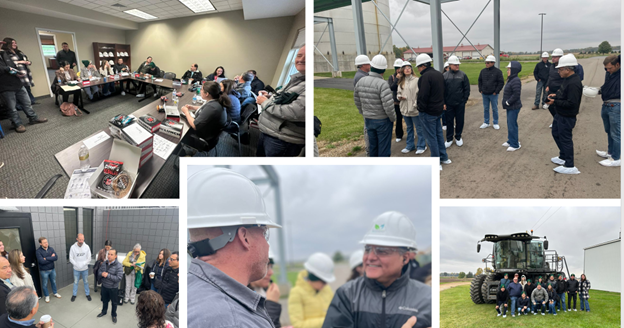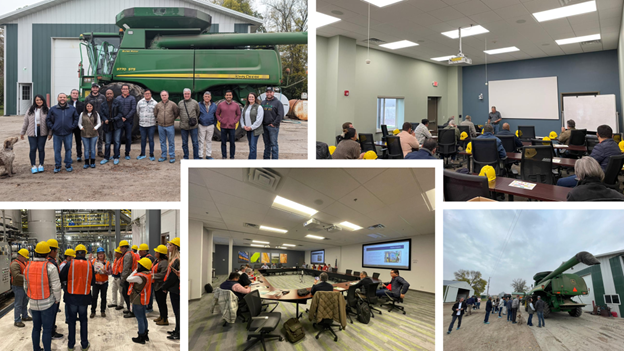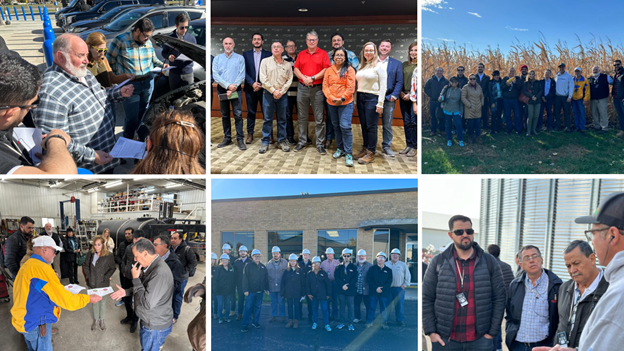Immediately after participating in the U.S. Grains Council (USGC’s) Global Ethanol Summit (GES), held in Reston, VA, a delegation of 40 people from 15 Latin American countries participated in three field visits to the states of Michigan, Minnesota and South Dakota to learn more about the ethanol production, supply and marketing chain in the U.S.

The first team, composed of representatives from the public and private sectors of Argentina, Colombia, Peru, Bolivia, Brazil, Paraguay and the Dominican Republic, visited Grand Rapids, MI, where they were able to visit the Carbon Green BioEnergy facilities, Holland Fuel Terminal and Kory Brodbeck’s farm, as well as hold meetings with Zeeland Farm Services Inc. and Michigan Corn Growers Association (MCGA), among other activities.

The second team, made up of representatives from Ecuador, El Salvador, Honduras, Jamaica and Uruguay, headed to Minnesota, where they began their tour with a visit to the Ellyn Oelfke farm, followed by a tour of the Heartland Corn Products ethanol plant, Minnoco Fuel Station and Magellan Roseville Terminal. Finally, at the Minnesota Corn offices, the team held meetings with the Minnesota Department of Agriculture, Minnesota BioFuels Association, Minnesota Corn Growers Association and Minnesota Corn Research & Promotion Council, among other key stakeholders.

The third and final team comprised representatives from Costa Rica, Guatemala and Panama, including public officials from the Ministries of Mines and Energy, Environment and Agriculture and delegates from the private sector and agricultural industry. These Central American (CTA) countries are considering implementing ethanol-gasoline blending programs starting in 2024. On its first day, the CTA delegation visited the farm of Ron and Keith Alverson, toured Dakota Ethanol’s plant and Vollan Oil. On the second day, the trade team visited the NuStar Energy pipeline terminal and a new Get-N-Go fuel station in Sioux Falls, followed by a tour of POET’s Chancellor ethanol plant and wrapping the agenda with a discussion at POET headquarters.
“The visits were an eye-opener for the participants not aware of the impact and magnitude of the U.S. ethanol industry and the role it plays for the agriculture sector,” said Juan Diaz, USGC regional ethanol consultant who led the team in Michigan. “The meetings helped recognize the importance of developing biofuel programs in the team’s own countries as a mechanism to enhance the agricultural sector, reduce emissions and improve fuel quality. We will continue our engagement in the region to expand the awareness of the use of ethanol and materialize the adoption of ethanol programs with a trade role.”
The Western Hemisphere proportionally produces and consumes the most ethanol and biofuels globally. Nearly 80 percent of ethanol production is concentrated in this area. Historically, the Americas have seen high levels of ethanol and gasoline production and blends, including the United States (E10-E15), Brazil (E27), Paraguay (E25), Argentina (E12), Colombia (E10), Jamaica (E10) and Bolivia (E10). Still, some countries have yet to establish ethanol mandates, such as those in Central America, Chile and Mexico. The region has great potential to continue developing markets that can use ethanol as a clean and cost-efficient mechanism to reduce the decarbonization of the transportation sector.
About The U.S. Grains Council
The U.S. Grains Council develops export markets for U.S. barley, corn, sorghum and related products including distiller’s dried grains with solubles (DDGS) and ethanol. With full-time presence in 28 locations, the Council operates programs in more than 50 countries and the European Union. The Council believes exports are vital to global economic development and to U.S. agriculture’s profitability. Detailed information about the Council and its programs is online at www.grains.org.
